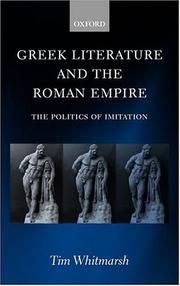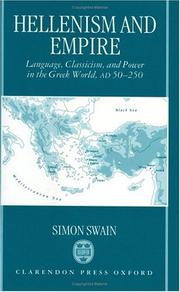| Listing 1 - 8 of 8 |
Sort by
|
Book
ISBN: 8876948627 9788876948626 Year: 2005 Volume: 17 Publisher: Alessandria Edizioni dell'Orso
Abstract | Keywords | Export | Availability | Bookmark
 Loading...
Loading...Choose an application
- Reference Manager
- EndNote
- RefWorks (Direct export to RefWorks)
Book
ISBN: 9783487150550 3487150557 Year: 2013 Volume: 153 Publisher: Hildesheim : Georg Olms Verlag,
Abstract | Keywords | Export | Availability | Bookmark
 Loading...
Loading...Choose an application
- Reference Manager
- EndNote
- RefWorks (Direct export to RefWorks)
Greek literature --- Aliens in literature. --- National characteristics, Greek. --- Littérature grecque --- Etrangers dans la littérature --- Grecs --- History and criticism. --- Histoire et critique --- National characteristics, Greek, in literature --- Aliens in literature --- History and criticism --- Littérature grecque --- Etrangers dans la littérature --- Noncitizens in literature. --- Greek literature - Rome - History and criticism
Book
ISBN: 0520957024 9780520957022 0520276817 9780520276819 9780520276819 0520344588 Year: 2013 Publisher: Berkeley University of California Press
Abstract | Keywords | Export | Availability | Bookmark
 Loading...
Loading...Choose an application
- Reference Manager
- EndNote
- RefWorks (Direct export to RefWorks)
The "Second Sophistic" traditionally refers to a period at the height of the Roman Empire's power that witnessed a flourishing of Greek rhetoric and oratory, and since the 19th century it has often been viewed as a defense of Hellenic civilization against the domination of Rome. This book proposes a very different model. Covering popular fiction, poetry and Greco-Jewish material, it argues for a rich, dynamic, and diverse culture, which cannot be reduced to a simple model of continuity. Shining new light on a series of playful, imaginative texts that are left out of the traditional accounts of Greek literature, Whitmarsh models a more adventurous, exploratory approach to later Greek culture. Beyond the Second Sophistic offers not only a new way of looking at Greek literature from 300 BCE onwards, but also a challenge to the Eurocentric, aristocratic constructions placed on the Greek heritage. Accessible and lively, it will appeal to students and scholars of Greek literature and culture, Hellenistic Judaism, world literature, and cultural theory.
Greek literature --- Balkan literature --- Byzantine literature --- Classical literature --- Classical philology --- Greek philology --- History and criticism. --- Greek literature -- Rome -- History and criticism.. --- Greek literature -- History and criticism. --- ancient literature. --- aristocratic constructions. --- classics. --- different model. --- diverse culture. --- engaging. --- exploratory approach. --- greco-jewish material. --- greek culture. --- greek heritage. --- greek literature. --- greek oratory. --- greek rhetoric. --- hellenic civilization. --- hellenistic judaism. --- historical. --- history. --- literary. --- roman empire. --- rome. --- second sophistic.
Book
ISBN: 9781442642164 1442642165 1442690364 9781442690363 Year: 2011 Volume: 49 Publisher: Toronto University of Toronto press
Abstract | Keywords | Export | Availability | Bookmark
 Loading...
Loading...Choose an application
- Reference Manager
- EndNote
- RefWorks (Direct export to RefWorks)
The Second Sophistic (50 to 250 BCE) was an intellectual movement throughout the ancient Greek and Roman world. Although it can be characterized as a literary and cultural phenomenon of which rhetoric is an essential component, other themes and values such as peideia, mimesis, the glorification of the past, the importance of Athens, and Greek identity pervade the literature and art of this era. From a workshop held at Universite Laval, Perceptions of the Second Sophistic and its Times brings together fourteen essays and a range of perspectives, including work from scholars in literature, philology, linguistics, history, political science, sociology, and religion. The essays explore the Second Sophistic and describe how the intellectual elites of this period perceived and defined themselves, how they were judged by later authors, and how we understand them today."--Pub. desc.
Second Sophistic movement --- Greek literature --- Rhetoric, Ancient. --- Seconde sophistique --- Littérature grecque --- Rhétorique ancienne --- History and criticism. --- Histoire et critique --- Rhetoric, Ancient --- History and criticism --- Second Sophistic movement. --- Littérature grecque --- Rhétorique ancienne --- Classical languages --- Greek language --- Greek rhetoric --- Latin language --- Latin rhetoric --- Second Sophistic school --- Rhetoric --- Ancient rhetoric --- Philosophy, Ancient --- Balkan literature --- Byzantine literature --- Classical literature --- Classical philology --- Greek philology --- Greek literature - Rome - History and criticism --- Rome (Empire) --- Rim --- Roman Empire --- Roman Republic --- Rome --- Romi (Empire) --- Byzantine Empire --- Italy

ISBN: 3515086412 9783515086417 Year: 2006 Volume: 14 Publisher: Stuttgart Steiner
Abstract | Keywords | Export | Availability | Bookmark
 Loading...
Loading...Choose an application
- Reference Manager
- EndNote
- RefWorks (Direct export to RefWorks)
Latin literature --- Greek literature --- Religion in literature --- Littérature latine --- Littérature grecque --- Religion dans la littérature --- History and criticism --- Congresses. --- Histoire et critique --- Congrès --- Rome --- Religion --- 292.2 --- Godsdiensten van de Romeinen --- 292.2 Godsdiensten van de Romeinen --- Littérature latine --- Littérature grecque --- Religion dans la littérature --- Congrès --- Balkan literature --- Byzantine literature --- Classical literature --- Classical philology --- Greek philology --- Religion et littérature --- Religion romaine --- Christianisme --- Actes de congrès. --- Relations --- Sources --- Religion et littérature --- Congresses --- Latin literature - History and criticism - Congresses --- Greek literature - Rome - History and criticism - Congresses --- Religion in literature - Congresses --- Rome - Religion - Congresses

ISBN: 0198140576 9780198140573 Year: 1990 Publisher: Oxford Clarendon
Abstract | Keywords | Export | Availability | Bookmark
 Loading...
Loading...Choose an application
- Reference Manager
- EndNote
- RefWorks (Direct export to RefWorks)
Comparative literature --- Greek literature --- Latin literature --- Greek and Latin. --- Latin and Greek. --- Appreciation --- History and criticism. --- Greek and Latin --- Latin and Greek --- Grecque et latine --- Latine et grecque --- --Littérature grecque --- --IIe s. --- -Literature, Comparative --- -Comparative literature --- Balkan literature --- -Greek influences. --- -Philology --- History and criticism --- Rome --- Greece --- Civilization --- Greek influences. --- History --- Literature, Comparative --- Rome ancienne --- Civilisation --- --History and criticism --- 464 --- Greek influences --- Littérature grecque --- Littérature latine --- Littérature comparée --- Histoire et critique --- Influence grecque --- Histoire --- --IIe s., --- Greek literature - Rome - History and criticism --- Latin literature - History and criticism --- Literature, Comparative - Latin and Greek --- Literature, Comparative - Greek and Latin --- Littérature grecque --- IIe s., 101-200 --- Rome - History - Antonines, 96-192 --- Rome - Civilization - Greek influences

ISBN: 0199240353 9780199240357 Year: 2002 Publisher: Oxford [etc.] : Oxford University Press,
Abstract | Keywords | Export | Availability | Bookmark
 Loading...
Loading...Choose an application
- Reference Manager
- EndNote
- RefWorks (Direct export to RefWorks)
Beschaving [Grieks-Romeinse ] --- Civilisation gréco-romaine --- Civilization [Greco-Roman ] --- Cultuur [Grieks-Romeinse ] --- Grieks-Romeinse beschaving --- Grieks-Romeinse cultuur --- Mimésis dans la littérature --- Balkan literature --- Byzantine literature --- -Civilization, Greco-Roman. --- -Greco-Roman civilization --- Greek literature --- -Greek literature --- -Civilization, Greco-Roman --- Hellenism --- Politics and literature --- -Politics and literature --- Literature --- Literature and politics --- History and criticism --- Appreciation --- -History --- Political aspects --- Rome --- -Greece --- -Rome --- -Rim --- Roman Empire --- Roman Republic (510-30 B.C.) --- Romi (Empire) --- Griechenland --- Grèce --- Hellas --- Yaṿan --- Vasileion tēs Hellados --- Hellēnikē Dēmokratia --- République hellénique --- Royaume de Grèce --- Kingdom of Greece --- Hellenic Republic --- Ancient Greece --- Ελλάδα --- Ellada --- Ελλάς --- Ellas --- Ελληνική Δημοκρατία --- Ellēnikē Dēmokratia --- Elliniki Dimokratia --- Grecia --- Grčija --- Hellada --- History --- -Relations --- Hellenism. --- History and criticism. --- Civilization, Greco-Roman --- Greco-Roman civilization --- Civilization, Classical --- Classical literature --- Classical philology --- Greek philology --- Greece --- Rim --- Byzantine Empire --- Rome (Italy) --- اليونان --- يونان --- al-Yūnān --- Yūnān --- 希腊 --- Xila --- Греция --- Gret︠s︡ii︠a︡ --- Relations --- Civilization, Greco-Roman. --- History. --- Mimesis in literature --- Emperors --- Littérature grecque --- Politique et littérature --- Mimésis dans la littérature --- Empereurs --- Duties --- Histoire et critique --- Histoire --- Devoirs --- Empire, 30 B.C.-284 A.D. --- Politics and government --- 146 B.C.-323 A.D. --- To 500 --- Greek literature - Rome - History and criticism. --- Politics and literature - Greece - History - To 1500. --- Politics and literature - Rome - History. --- Greek literature - Appreciation - Rome.

ISBN: 0198147724 9780198147725 Year: 1998 Publisher: Oxford : Clarendon Press,
Abstract | Keywords | Export | Availability | Bookmark
 Loading...
Loading...Choose an application
- Reference Manager
- EndNote
- RefWorks (Direct export to RefWorks)
Beschaving [Grieks-Romeinse ] --- Civilisation gréco-romaine --- Civilization [Greco-Roman ] --- Cultuur [Grieks-Romeinse ] --- Grieks-Romeinse beschaving --- Grieks-Romeinse cultuur --- Classicism. --- Littérature grecque hellénistique --- Grec hellénistique (Langue) --- -Greek language, Hellenistic (300 B.C.-600 A.D.) --- -Greek literature --- -Balkan literature --- Byzantine literature --- Greek language (Koinē) --- Hellenistic Greek --- Koinē (Greek language) --- -Civilization, Greco-Roman. --- -Greco-Roman civilization --- Balkan literature --- Littérature grecque hellénistique --- Grec hellénistique (Langue) --- Classicism --- Greek literature, Hellenistic --- -Hellenism --- Imperialism --- Nationalism --- -Power (Social sciences) --- Civilization, Greco-Roman --- Literature and society --- -Politics and literature --- Empowerment (Social sciences) --- Political power --- Colonialism --- Empires --- Expansion (United States politics) --- Neocolonialism --- Pseudo-classicism --- Literature --- Literature and politics --- Literature and sociology --- Society and literature --- Sociology and literature --- Consciousness, National --- Identity, National --- National consciousness --- National identity --- Hellenistic Greek literature --- History and criticism --- Historiography --- Congresses --- Political aspects --- Social aspects --- Greece --- Rome --- Rim --- Roman Empire --- Roman Republic (510-30 B.C.) --- Romi (Empire) --- Griechenland --- Grèce --- Hellas --- Yaṿan --- Vasileion tēs Hellados --- Hellēnikē Dēmokratia --- République hellénique --- Royaume de Grèce --- Kingdom of Greece --- Hellenic Republic --- Ancient Greece --- Ελλάδα --- Ellada --- Ελλάς --- Ellas --- Ελληνική Δημοκρατία --- Ellēnikē Dēmokratia --- Elliniki Dimokratia --- Grecia --- Grčija --- Hellada --- Relations --- -Relations --- Greek language, Hellenistic (300 B.C.-600 A.D.) --- Greek literature --- Hellenism. --- Imperialism. --- Politics and literature --- Power (Social sciences). --- Social aspects. --- Appreciation --- History and criticism. --- Historiography. --- Hellenism --- Power (Social sciences) --- Greco-Roman civilization --- Civilization, Classical --- Exchange theory (Sociology) --- Political science --- Social sciences --- Sociology --- Consensus (Social sciences) --- Anti-imperialist movements --- Caesarism --- Chauvinism and jingoism --- Militarism --- Aesthetics --- International relations --- Patriotism --- Autonomy and independence movements --- Internationalism --- Political messianism --- Classical literature --- Classical philology --- Greek philology --- Byzantine Empire --- Rome (Italy) --- اليونان --- يونان --- al-Yūnān --- Yūnān --- 希腊 --- Xila --- Греция --- Gret︠s︡ii︠a︡ --- Civilization, Greco-Roman. --- Politique et littérature --- Littérature et société --- Civilisation gréco-romaine --- Classicisme --- Hellénisme --- History --- Histoire et critique --- Aspect social --- Histoire --- Greek literature [Hellenistic ] --- Greek language [Hellenistic ] (300 B.C.-600 A.D.) --- Greek language, Hellenistic (300 B.C.-600 A.D.) - Social aspects - Greece. --- Politics and literature - Greece - History. --- Nationalism - Greece - Historiography. --- Civilization, Greceo-Roman. --- Greece - Relations - Rome. --- Rome - Relations - Greece. --- Greek literature, Hellenistic - History and criticism. --- Greek language, Hellenistic (300 B.C.-600 A.D.) - Social aspects. --- Greek literature - Rome - History and criticism. --- Greek literature - Appreciation - Rome. --- Politics and literature - Greece. --- Literature and society - Greece.
| Listing 1 - 8 of 8 |
Sort by
|

 Search
Search Feedback
Feedback About UniCat
About UniCat  Help
Help News
News